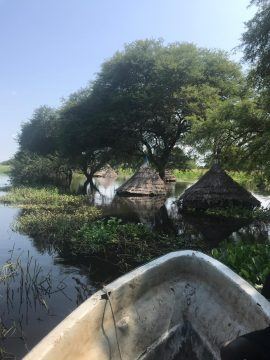Joshua Craze in n + 1:
 In January, I lived in two worlds. In the first, every day contained catastrophes, loud and insistent. Most of them had already happened by the time I woke up and turned on my phone. I would hear from humanitarians reporting casualty numbers from clashes in Jonglei, pastoralists telling me about raids on the Mayom-Warrap border, and politicians whispering about tensions in Juba, South Sudan’s capital. It was morning in America, mid-afternoon in East Africa, and everything seemed to be on fire. I’ve spent a decade working as a conflict researcher in South Sudan, for an alphabet soup of organizations, and I know the slow pace of life across much of the country. In Mayom, despite South Sudan’s ongoing civil war, most of the day is played to the rhythm of the area’s beloved cattle. Raiding takes place alongside milking and grazing. However, if you were to only read my WhatsApp and Signal messages, life in South Sudan would appear to be an endless train-wreck of catastrophes piling up on each other. No one sent me messages about milk. My mornings were spent finding out all I could about the conflict in the country, writing up reports, and then, finally, East Africa would sleep, and my other world could begin.
In January, I lived in two worlds. In the first, every day contained catastrophes, loud and insistent. Most of them had already happened by the time I woke up and turned on my phone. I would hear from humanitarians reporting casualty numbers from clashes in Jonglei, pastoralists telling me about raids on the Mayom-Warrap border, and politicians whispering about tensions in Juba, South Sudan’s capital. It was morning in America, mid-afternoon in East Africa, and everything seemed to be on fire. I’ve spent a decade working as a conflict researcher in South Sudan, for an alphabet soup of organizations, and I know the slow pace of life across much of the country. In Mayom, despite South Sudan’s ongoing civil war, most of the day is played to the rhythm of the area’s beloved cattle. Raiding takes place alongside milking and grazing. However, if you were to only read my WhatsApp and Signal messages, life in South Sudan would appear to be an endless train-wreck of catastrophes piling up on each other. No one sent me messages about milk. My mornings were spent finding out all I could about the conflict in the country, writing up reports, and then, finally, East Africa would sleep, and my other world could begin.
I was staying in a small town in upstate New York, where, I told myself, I could finally sit down, after my last trip to South Sudan, and do some writing.
More here.
